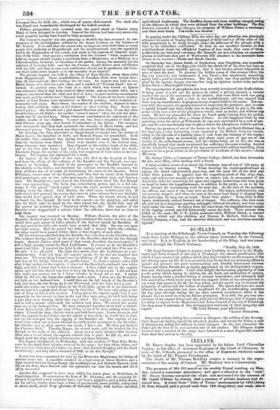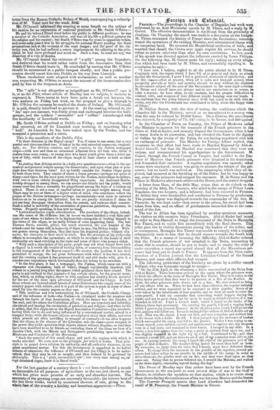IRELAND. Mr. Henry Su g den has been appointed by his father,
Lord Chancellor Sugden, to the office of Assistant-Registrar of the Court of Chancery, in room of Mr. O'Keefe, promoted to the office of Registrar, rendered vaosait by the death of Mr. Francis Prendergast. The death of Mr. Thomas Bunbury creates a vacancy in the repre- sentation of the county of Carlow. Mr. Bunbury was a Conservative.
The presence of Mr: O'Connell at the weekly Repeal meeting, on MOM- day, caused a numerous attendance, and gave a stimulus to the "rout." Mr. Henry Grattan occupied the chair; and accounted for the absence of Mr. Smith O'Brien by stating that a pressure of private business had de- tained him. A letter from John of Tuarn," accompanied by 1271. (being di. from himself, and a pound each from 124 clergymen) was read; also a
letter from the Romen Catholic Bishop of Meath, aecompanyina a subscrip- tion of 5t. Total rent for the week, 355e
Mr. O'Connell addressed the meeting at scene length on the subjeet of his motion for an expression of national gratitude to Mr. Smith O'Brien— He and his beloved friend stood before the public in different positions: he was a member of the Catholic Association, and was all his life a political agitator for his Peligiou and his country; but Smith O'Brien was for years in opposition to biro, and eveuteally alined. hint in his struggles for natiorwe liberty peeffieg tee State prosecutioas end at the niouteat. of the most danger; and the proof of his sin- cerity wee, that he had suffered a severe imprisonment for adhering to the prin- ciplea he had siuce professed and acted on. Such a man, he need not say, was deserviae of a vote of theatre.
Me. O'Connell denied the existence of "a split" among the Repeaters- and deolared that he would rather retire from the Association than that. Smith O'Brien should leave it. Ile coechttled by meeing that Ur, O'Brien should be entertained at a public banquet shertly, and that a public pro- cession should escort him into Dublin on his way from Limerick.
These resolutions were adopted with acelantatien; as well as another one, requesting Mr. O'Brien to accept the amount of the incarceration-fees paid by him to the Sergeant-at-Anns.
The "split" is not altogether BD insignificant as Mr. O'Connell says it is, err its the Pilot, whose article of Monday last we subjoin, is desirous to repreeent is. There seems to have been quite a. break out between the two sections ea Friday last wee,k, on the proposal to. give a triuraph to Mr. O'Brien the mowed he reached the shores of Ireland. Mr. O'Connell, it is, said, directly interfered to prevent it. At the meeting referred, to, the " lio," says one imamate was freely gives and exchattgeol between the bailie genets, and the epithets "scoundrel" and "ruffian" interchanged with the familiarity, of household words.
Mr, Smith O'Brien arrived at Dublin on Friday; and on learning what had occurred, set off for Limerick next morning, in something dike a " huff," At Limericks he has been waited upon by the Trades; mid has accepted a "accession and a solvate
This is the manifesto of the Dublin Pilot.
Is there disunion in the Repeal camp.? Yes if taken in one sense, but a very partial and circumscribed one; if taken la the real extended sense.—no, no The division consists, and only consists, in the Nation newspeper clique—with, now and then an occasional adherent front old fools wise think it makes them seem youog, or young ones wile fancy youth gives them a letter pa- tent of folly, while knaves, of the clique laugh in their sleeves at both as their dupes.
"In stating that divlsioa exists in ebody, two questions occur—what laths nue market and personal weight among the dissentimass; and upon what plea or prin-
ciple does that disunion turn? Let us briefly consider the Nation clique party by. both these tests. They consist of about a dozen persons—perhaps. not quite so maey—and these, foe the most part, writers for the Nation., lawyerlings in embryo,
with two or three elderly disappointed Whig expectants. An Assistant Barrise terslaip dropped in among them, we can assure our friends and the public, would create more fun than a scramble for gingerbread among the boys of a broken-up school. There is not a man of e.s,alted talent or personal weight among them.
There may be two or three of a higher order of mind, who sometimes reflect the jargon of the Nation newspapea:-perhaps unconsciously-ea:id seem to external lookers-on to be among the initiated; but we are greatly mistaken if therm do not ere long disengage themselves from the coterie, and embrace their country. Such a cabal is unworthy of the association of generous patrintism, eloquence, or virtue. Properly speaking, it has now no heads "Latitudinarianism repels subordination. The members of the clique, indeed, usa the name of Mr. O'Re.: but he is-,-or we have imbibed a very false esti- mate of one whom we believe to be higliminded-einespaele of lending himself to the views of the clique, or we verily, believe of even suspecting therm The late Thomas Davis, amiable, gifted, but mach overrated, the real exacter of tha school-eand his alma still is bepeaeis, if there be any, the. Wale.* leader. With- out genius among theeaseleett, they. WO, Waal departea genius; without cha racter, his character is their stock in trade. But the attempts M hie style—the. effertis' to accomplish the myatevione, at. which be ezeelleeln the bee& of their mediocrity are most revolting te the testa mid sense of these wheRoalees eitht.a.
"With suca a description of the party, people may ask what danger from such a clique? is, it worth the trouble of writing down, or removing from intermeddling
in the management of the Itepeal cause P—We answer, the position it has been permitted to occupy, the too great forbearance with which it has been treated, and the cunning engines it hes possessed itself of, and still works with, give it a aasetaeasas impel:sauce which intriesieelly does not beloug to its member& In the first place, it has a newepaper, the Areteue, which came out with a cluireater and circulation; beta of which, thread; considerably impairea, still
adagre to a journal long after the causes which produced them Mare ceased. The pert/ is, not cophoed to that journal—it has certain others, for the present name- leas, which, on telling topics, throw in with cautious but stealthy hands material for the use of the more open adversary of O'Connell and the Clergy. In both these schools are fostered small broods of minor litterateurs who supply some of the country papers with editors; and it is part of the system to push as many of these small fry into the country papers as they can.
"This insidious and ever undermining foe of O'Connell, the Catholic Clergy, and of the influence of both—the Nation—is circulated under the auspices awl
through the funds of that As.socistiou, of which the former was the founder, is the seed, and the others the Corinthian pillars, Here are treachery and infidelity, cieceeited and bearing the credentials of patriotism and religion: and when to this is added, that this clique are on the Repeal Association Committee--(its members,
having little else to do, and being influenced by a conventional motive, attend in a compact body; while the honest citizens are employed about their affairs, and even
when present are often unwilling to wrangle or contend)—it too often happens that the clique, in the absence of the Liberator, rule the roast—grow rampant in the power they yield—proolaim their objects almost without disguise; so that they have been described to us by friends as reminding them of the ideast we form of a Jacobin Club, with the Mauats and Robeepierres proclaiming open war on the Mirabeaus and Condorcets of the Moverriout,
"Such the material of this small clique, and such the engines with which it works mischief. We come now to the principle for which It works. That prin-
ciple is to pound down religion, its authority, and all authority whatever, in one
great. academical mortar. For this the Government is supported in its Infidel scheme of eduaations the influenza of O'Conitell and the Clergy is to be under-
mined, that they may be set at naught, mid then Ireland to be governed by philosophy. This is a plain, unvarnished tale '; but every man among us, ex- cept demented dopes, know it is literal truth."
For the last quarter of a, century there h s not been recollected a month so favourable for all purposes of agriculture as the one just closed, or one which has given more promise of an early and abundant harvest The accounts of the growing crops are extremely favourable; the intense heat of the last three weeks, varied by occasional showers of rain, giving to the faue of the country a healthy and lexurianeappearance.—Times.



















































 Previous page
Previous page